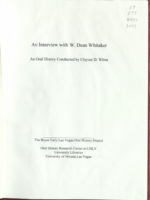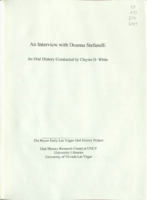Search the Special Collections and Archives Portal
Search Results

Interview with Curtis Rufus Amie Sr., January 21, 2005
Date
Archival Collection
Description
Narrator affiliation: Miner, Reynolds Electrical and Engineering Company (REECo)
Text

Interview with Vernon Henry Jones, October 4, 2005
Date
Archival Collection
Description
Text

Transcript of interview with Dean Whitaker by Claytee White, April 5, 2010
Date
Archival Collection
Description
William Dean Whitaker was born in 1925 and raised in a suburb of Los Angeles, California. Dean, as he is known, talks briefly about his parents and his brothers, for his youth quickly ended when he joined the Air Force and became an aviation cadet once he had turned 18 years old. The year was 1943 and World War II was raging. He became a member of the 398 th Bomb Group and flew twenty missions before being captured by the Germans. In this oral history, Dean talks with vivid recollection of the day he was captured and details of being a POW in Germany. Among his anecdotes are those of his mother's unwavering belief that he would return home, the humanity of a German soldier, and of meeting Gen. George Patton. Included are photos and excerpts from his personal history of his life during the war. Dean and his wife Lucille moved to Las Vegas in 1990.
Text

Transcript of interview with Dayvid Figler by Barbara Tabach, June 22, 2016
Date
Archival Collection
Description
Dayvid Figler (1967 - ) is the quiet boy who became an insightful and creative contributor to the local culture of Las Vegas. The oldest of Barbara and Meyer Figler?s three children, he was four years old when the family station wagon reached Las Vegas in 1971. They moved in with Uncle Izzy (aka Big Irish) Figler for a few months. Having the ?juice,? Dayvid?s father soon became a Pan dealer on the Strip. As the family grew, Barbara eventually immersed her energies in her children?s activities, Hadassah and Temple Beth Sholom. In this oral history, Dayvid also recalls his awkward, but incredibly interesting youth, his bar mitzvah at Temple Beth Sholom, and path to a successful career as a criminal defense attorney. He also talks about embracing Las Vegas as his home, owning a home in John S. Park neighborhood and mentions a number of literary depictions of Las Vegas that he admires. Dayvid describes growing up a ?casino kid? who lived in an apartment near the Riviera Hotel. This, in addition to his slight stature and academic brilliance, may have set him apart from many of his childhood peers. He graduated from Valley High School at the age of 16 and by the age of 23 he was a rising star in the legal world. He looks back with appreciation to his list of mentors who encouraged him along the way. Dayvid is also a local favorite as an essayist and poet. For a number of years he could be heard on KNPR/NPR. He has been a performer in hundreds of productions that featured his comic wit and writings, from Lollapalooza to Tom and Jerry?s on Maryland Parkway.
Text

Transcript of interview with Steven Eisen by Barbara Tabach, September 14, 2016
Date
Archival Collection
Description
Steven Eisen (1966 - ) is the oldest son of Barry and Beverly Eisen, who were part of the migration of Jews from St. Louis to Las Vegas in the 1960s. He is married to Stacy Fisher and the older brother to Andrew and Robert Eisen. They are members of an early group of born-and-raised Las Vegans. Growing up Jewish, he became a bar mitzvah, belonged to B?nai B?rith Youth Organization. In this oral history interview, Steve recalls enjoyable stories of growing up in Las Vegas and humorous anecdotes of mistaken identity since the three brothers bear such strong physical resemblances. Today he finds himself enjoying his career as CEO of the Children?s Heart Center since 2001 and talks about the success and reputation of the pediatric medical group. It was his first job as a fourteen year old helping Theodore Manos and Michael Cherry during the MGM fire litigations where he learned about the legal world and being organized as a path to success in whatever he might pursue. Steve graduated from University of Missouri, attended law school at Washington University in St. Louis, and received his business degree from UNLV. Throughout the interview, he recalls the steady and strong involvement of his parents in their sons? educations. He also describes their active connection with the Jewish community and organizations. Steve?s wife Stacy is a professor in physical therapy at Touro University.
Text

Transcript of interview with Patricia "Pat" Marchese and Lamar Marchese by Stefani Evans and Claytee White, February 7, 2017
Date
Archival Collection
Description
In this interview, the cultural power couple recall their early impressions of Las Vegas, their beloved Ninth Street house built by Marion Earl, and the changes that caused them to move when spot zoning destroyed their close-knit downtown neighborhood. Lamar speaks of the founding of public radio KNPR and KCNV, of finding studio space, of obtaining grant money to build on the campus of the (now) College of Southern Nevada, and of acquiring the Peter Shire sculpture that graces the front of the studio. He talks about the vision of Charles Hunsberger, of Hunsberger's fall, and of politically appointed boards of trustees. Pat shares her experience of meeting people in a babysitting co-op and the UNLV Art Department, getting her UNLV Master's degree in public administration, and her work in cultural programming with the City of Las Vegas and with Clark County. She speaks of creating gallery, classroom, and performing space at the City's Reed Whipple building and the Charleston Heights Art Center; of founding the Rainbow Company Youth Theatre; of developing Clark County's Desert Breeze Park, Flamingo Senior Center, and the Wetlands, among others; of placing exhibits of the Clark County Museum at McCarran International Airport; of the Public Arts Commission, the Airport Arts Commission, the Allied Arts Council, and of developing Community Development Block Grant programs for the City of Las Vegas and Clark County. Throughout the interview, Pat and Lamar Marchese exemplify why Southern Nevada got lucky in 1972. As the duo grew in their knowledge of and passion for the arts, they also honed their skills at bringing the arts to the public. And we, the Southern Nevada public, continue to benefit as their legacies live on through public radio, community arts programming, and useful and accessible parks.
Text

Transcript of interview with Stavros Anthony by Claytee White and Stefani Evans, July 24, 2017
Date
Archival Collection
Description
Born of humble beginnings to a sheep farming family in Cyprus, Greece, Stavros Anthony embodies the legacy of the American spirit and ability to reach as far as one can to achieve personal greatness. His family came to the United States in 1955 and moved to Kansas City, Missouri, where his father started working in the restaurant business as a cook until 1967. Moving to Detroit proved to be a benefit for the family, as his father became the executive chef for the Grosse Point Yacht Club, one of the most exclusive clubs in the country. He went from sheep herding, to peeling potatoes, to the executive and afforded his family a typical middle class lifestyle. He graduated from high school in 1975 and attended Wayne State University, earning is B.A. in criminal justice and starting his career in policing with the university’s police department. Upon graduating in 1980, he faced a frozen job industry in Detroit due to a very bad auto recession. He applied for and secured a position as a po
Text

Transcript of interview with Roberta Kane by Barbara Tabach, September 6, 2017 and May 22, 2018
Date
Archival Collection
Description
Roberta “Bobbie” Kane (1932 - ) is the first known Jewish child born in Las Vegas. Her parents, Sallie and Mike Gordon, were liquor stores owners and among the founders of the first Jewish congregation in Las Vegas. Bobbie’s childhood remembrances are as a young girl who was fully aware that “Friday nights were reserved for religious services. Saturdays were always reserved for gin rummy.” In the late 1940s, as a teenager at Las Vegas High School (and 1950 graduate), Bobbie recalls Las Vegas as a small town and a joyful place to grow up. She briefly attended University of Southern California before marrying and beginning her family. In time, life brought her back to live with her parents. She pursued a career working for the Desert Inn group of hotels and helped open the Stardust in 1957. She was mentored by Mark Swain, “a six foot-four hunk of a cowboy” who worked for Moe Dalitz. This experience included driving Mark’s pink Cadillac to pick up hotel guests. This provided her with a
Text

Transcript of interview with Deanna Stefanelli by Claytee White, May 3, 2010
Date
Archival Collection
Description
Deanna Stefanelli and her family moved to Las Vegas when her husband John Stefanelli accepted a position as a professor in Food and Beverage at UNLV. She took a part-time job in the admin office of the university's library in 1981. It was also an ideal time for her to return to college to finish her degree. Eventually she became full-time and enjoyed the growth and change of UNLV and the library. Deanna recalls the physical and personnel changes of the library. She describes some of the fun activities that kept them a close work community—from the Friends of the Library to book sales and pancake breakfasts, to a newsletter and learning to make sushi with Myoung-ja Kwon.
Text

Transcript of interview with Bruce Layne by Claytee D. White, June 18, 2004
Date
Archival Collection
Description
Bruce Layne came to Las Vegas in March of 1955 when he was 10 years of age. He attended High school at Bishop Gorman and college at the University of Nevada Las Vegas where he received a B.S. in Economics. In college, he played baseball for three years and was named All Conference Player in 1966. Growing up in Las Vegas, two of his closest long time friends are Governor Bob Miller and Tito Tiberti. Bruce later went on to become the President of Layne & Associates Insurance which was the largest Insurance Agency in Nevada. Bruce tells fabulous stories of his 40-year experience in the Las Vegas community. When he first arrived there were only about 25,000 people living here. Since then, Bruce has been witness to the enormous growth the city has undergone. Throughout the interview, he discusses his book, My Gift, which he wrote after he discovered he had Parkinson's disease in 1999. The book contains valuable advice on life and it has touched the lives of many people who have read it. Today Bruce Layne is relentlessly fighting his battle with Parkinson's disease both for himself and for thousands of others. He continues to have a positive attitude and is supported by his wife, Sherry Layne, and his two sons, Chad and Trevor. VI
Text
